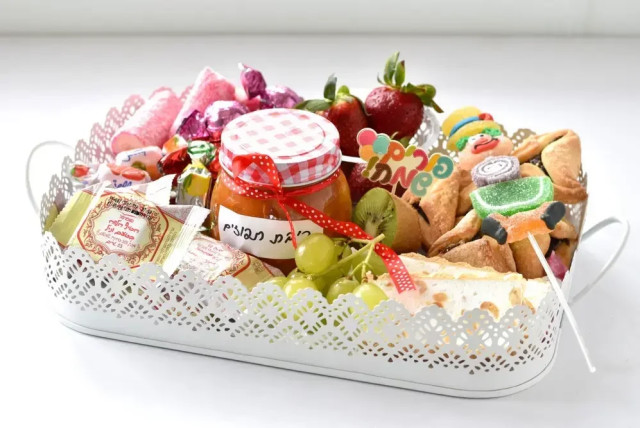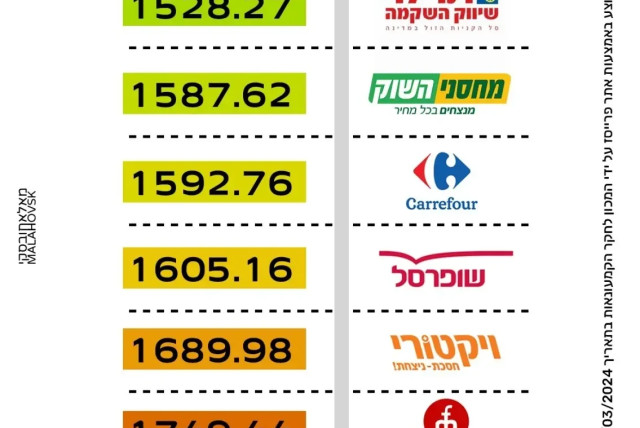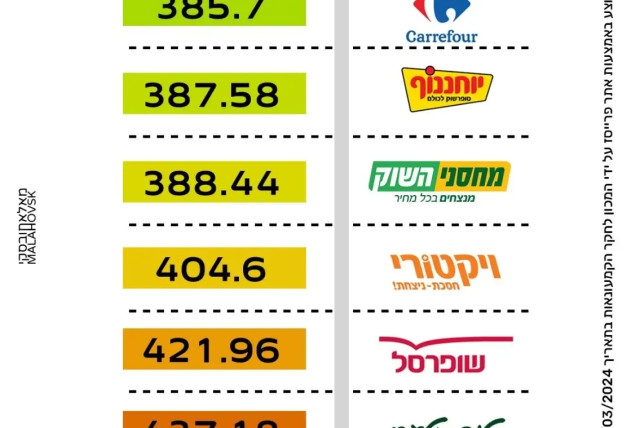Delivery of dishes & wine: gaps of tens of percent between the chains

Purim and Ramadan approach: testing confectionery, snacks, wine prices. Which chain is cheapest, where to save? Marketing chains gear up for holiday rush.
Purim is around the corner and before we celebrate it with costumes, sweets and alcohol we checked how much it would cost us this year to fulfill the mitzvah of delivering the dishes and have a proper feast.
This time there is an overlap in times between Purim and Ramadan, despite notable cultural and religious differences between the two holidays. What is certain is that these days will lead to increased consumption and a jump in the income of the food marketing chains. The holiday of Purim, marked by joy and eating sweet foods, clashes in nature with Ramadan, which is characterized by a long daily fast.
While Muslim culture forbids the consumption of alcohol, in Jewish culture drinking wine and alcohol on Purim is considered a mitzvah in the spirit of the holiday. Despite the differences, the meeting point between the holidays is the love of sweets and increased consumption of sweets, chocolate, cookies and hospitality and leisure products. During Ramadan, Muslims fast during the day and enjoy sweet foods at night.
On Purim, the Jewish sector, especially the ultra-Orthodox and the religious, shows records in the consumption of sweets and hospitality products.
Naturally, the food marketing chains prepare in advance for the holidays with promotions, advertisements and special displays to increase the rate of sales and make even those who did not really plan to celebrate or consume products that characterize these days to be tempted and put another candy or bottle of wine in the cart. In the ultra-orthodox sector, the preparations include a wide variety of sweets and unique products, in order to put together a proper and respectable meal delivery that will suit the needs of a large and extended family. For a quarter of Israel's population, delivering meals is not only a pleasant custom but a mitzvah and halakha.
The mitzva obliges the Jews to send portions to each other, and is one of the four main mitzvahs of the holiday of Purim. Israel, in its cultural and religious diversity, presents equal percentages of Arabs and religious/Orthodox among the population. The holidays bring all communities to consume large amounts of sweet products, and present the commonalities and differences within Israeli society.
About two years ago, the Israeli market experienced shortages in the products of the beloved and leading brand in the chocolate and sweet snacks segment - Strauss Elite products. The crisis in production, which led to empty shelves and shortages without a proper response to the consumer in the marketing chains, gave the company a boost to refill the shelves and launch new products in the last year upon its return to regular operations. But at the same time, various manufacturers and importers took advantage of the opportunity to introduce new brands and products to the local market in a segment with high rigidity and loyalty among Israeli consumers in an attempt to educate the consumer that it might be possible otherwise. While Strauss was engaged in improving production conditions, its main competitors enjoyed significant growth in sales volumes.
For example: the Milka brand, marketed by the Diplomat company, showed a significant jump in demand and market shares. The Godiva brand, imported by Vysotsky, also received a surprising opportunity to grow in the Israeli market, and the Roshan brand, which was known mainly to expats from the CIS countries, received increased exposure on the shelves of the various supermarkets.
Most of the brands that have grown and captured market shares show a jump in the average price for the consumer at the same time. Lesser known brands, many of them from Eastern European countries and Turkey, penetrated the market and got an unusual opportunity to enter the consumer's home. The Israeli customers, who are very loyal to the Elite brand, agreed to try something new following the shortages. Some of the new products were able to adapt to the Israeli taste and prosper even after the return of Elite products to the shelves. But not all new products were able to be liked by all audiences.
The ultra-Orthodox religious sector, for example, avoids products containing foreign milk, so not all innovations were seen as appropriate. On the other hand, in the Arab sector, the innovation proved to be successful. The consumer sector there is known to be fond of international brands, and the manufacturers benefited from revealing new products to consumers, an action that might not have taken place without the crisis. The current situation in the market demonstrates the flexibility and dynamism of the Israeli market, and the potential for innovation and diversity in the field of sweets and chocolate and how a crisis leads to opportunities.
How did we test?
Package delivery contains sweets and snacks as well as bottles of wine or grape juice. We put together a basket of confectionery products, snacks and pastries containing 37 products from well-known brands, including chocolates from Elite, Milka, Godiva, Lindt, Kinder, Ferrero and other confectionery products such as candies, cookies Elite, Assem, Maraba, Luaker, Assem snacks and more.
We reviewed the basket in 6 leading marketing chains.
The result: the gap is more than 22% between the cheap basket in the Rami Levy chain (confectionery, snacks and pastries) and the more expensive Freshmarket chain at NIS 82. (see the table).
Drink wisely
But sweets are not enough to deliver the dishes since this is only one of four mitzvahs. The second mitzvah of the holiday is to have a feast, to drink until the end. The consumption of wines during the holiday of Purim registers a sales record among the ultra-Orthodox religious population, even more than the holiday of Passover when there are consumption records for all consumers in Israel.
Unlike Pesach, on Purim they drink not only wine but also various alcoholic beverages. The culture of wine and alcoholic beverage consumption in Israel is developing and changing, with the Jewish sector being dominant. The rich culture of wine consumption begins with the Kiddush glass on Shabbat evening and spreads to cocktail evenings, happy events and parties, while maintaining the principle "because wine will make the human heart happy". The culture of wine consumption in Israel is built on a broad Torah and is a domain unto itself, expressed not only in drinking but in global folklore and extensive knowledge.
The wine market in Israel is divided into several segments, with the basic division being the differentiation between Kiddush and Tirosh wines and their types for table wines. Kiddush wines, which present a traditional variety, experience a declining demand over the years, while table wines at higher levels benefit from a wider public that moves from sipping at Kiddush to a traditional experience and drinking with finer wines and shows a controlled increase in recent years.
In Israel there is a significant amount of wineries, most of them do not "meet" the buyers in the marketing chains but in different sales channels, in specialized stores, in direct marketing and in visitor centers. In the marketing chains we will find the well-known and leading series of the well-known wineries such as Carmel, Tabor, Teperberg, Barkan, Binyamina and Hermon wineries. For the general public, the identification of wine levels is characterized by different price ranges: from NIS 25 per bottle to the higher prices of NIS 100 per bottle, which are less common in the marketing chains.
The culture of wine consumption in Israel reflects the diversity and cultural richness of the country. From the Kiddush glass to cocktail evenings, wine is an integral part of social and cultural life in Israel, but despite the growth the consumer consumes an average of 8 bottles per year compared to European countries where consumption reaches more than 50 bottles per year.
The surge in consumption comes not only from the ultra-orthodox and religious sector but Also from the secular sector that likes the holiday of Purim, which brings with it joy and parties, with alcohol being an integral part of it. For the purpose of the test, we put together a basket of wines and alcohol from the most common brands in the alcohol market in the marketing chains with 51 products from well-known brands, including Arak Elit and Ashkelon, Grants whiskey, alcoholic cider, alcoholic cocktails, beers Carselberg, Goldstar, Carmel wineries, Barkan, Rekanti, Hermon, Gamla and even energy drinks.
Here, too, we surveyed 8 leading chains to examine where we will find the most profitable basket just before we pour the first glass.
The result: we found the affordable basket of wines and alcohol products for the holiday feast at the Yohannoff chain where it costs NIS 1,525 compared to the same basket at the Tiv Taam chain for which we paid NIS 239 more - a difference of more than 15% between the baskets. So even if you drank a glass of wine during the Purim celebrations, it is important to maintain a wise purchase and consumer responsibility.
Save expenses
So before entering the supermarket, go over your shopping list again. Resisting temptations on the sales floor can save you unnecessary expenses and keep the budget. If you invest in preparing package deliveries, consider choosing biodegradable or multi-use packaging. It is an environmentally friendly solution that also reduces waste. Try to reduce the amount of sweets in the portion deliveries and replace them with healthier and more natural solutions. Fresh or dried fruit, nuts and homemade pastries are just examples of gifts that are both tasty and useful. This way you can enjoy a happy Purim holiday, safe and aware of your needs and those of the environment.
**The surveys are based on data from the website of the Ministry of Economy and the Pricez system and are correct as of 11.3. They were carried out by the Retail Research Institute.
Jerusalem Post Store
`; document.getElementById("linkPremium").innerHTML = cont; var divWithLink = document.getElementById("premium-link"); if (divWithLink !== null && divWithLink !== 'undefined') { divWithLink.style.border = "solid 1px #cb0f3e"; divWithLink.style.textAlign = "center"; divWithLink.style.marginBottom = "15px"; divWithLink.style.marginTop = "15px"; divWithLink.style.width = "100%"; divWithLink.style.backgroundColor = "#122952"; divWithLink.style.color = "#ffffff"; divWithLink.style.lineHeight = "1.5"; } } (function (v, i) { });



